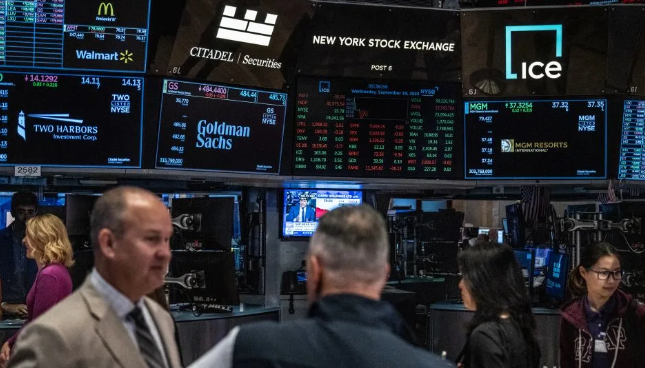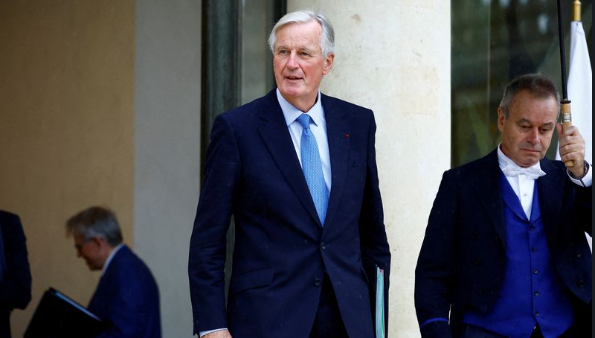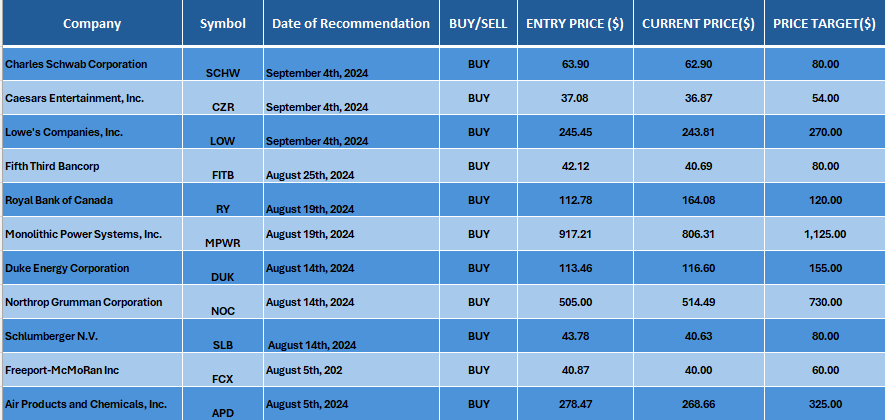
Date Issued – 27th September 2024
We May Finally Be Emerging From Our Economic Slump
It’s hard to feel good about the economy when your personal finances are strained. So, I won’t tell you everything is perfect. But for the first time in years, there are some encouraging economic shifts on the horizon despite the lingering headache of high housing costs. As Matt Phillips from Sherwood pointed out recently, the era of “meh-to-bad vibes” seems to be fading, thanks to two key factors: falling gas prices and a surging stock market. Now, gas prices and the stock market don’t directly reflect the overall health of the economy. But they’re what economists call psychologically important indicators. We may not all be watching employment data or tracking global oil production, but we do notice when the stock market makes headlines or when the cost to fill up our cars drops.
It’s basic vibenomics: stocks up + gas down = better vibes.
Currently, the average price of a gallon of gas in the U.S. is around $3.21, and some analysts expect it to fall below $3 by the end of October. That’s good news for drivers, and even better news for politicians, as presidential approval ratings tend to tick up when fuel is cheaper regardless of the president’s lack of direct control over oil prices. Meanwhile, U.S. stocks hit record highs last week after the Federal Reserve’s rate cut, and all three major indexes are on track for a positive September—historically the worst month for Wall Street. After two years of battling inflation and high interest rates, things are beginning to normalize. The Fed, confident that inflation is finally under control, slashed interest rates for the first time in four years, and signaled more cuts are coming. This makes borrowing easier for businesses and reduces the financial strain on consumers, like when paying off credit cards. Unemployment remains low at around 4%, and wage growth has been outpacing inflation for the past 18 months. These trends bode well for the consumer-driven economy.
The Housing Crisis: A Persistent Challenge
The term “vibecession,” popularized in 2022, captured the widespread feeling that the economy wasn’t as strong as it appeared on paper. Jobs were abundant, and GDP was growing, but the sting of high prices and steep interest rates left people feeling disheartened. According to Brendan Duke, a senior director for economic policy at the Center for American Progress, interest rates play a huge role in shaping our economic mood. “People have been saying for the past year that it would take time for the falling inflation and interest rates to resonate with the public. I think that moment is finally here,” he explained. But there’s one sector that continues to put a damper on the good news: housing. There’s no sugarcoating it—shelter costs are sky-high. Renters are struggling, and potential homebuyers face steep prices, limited inventory, and high mortgage rates. While the Fed’s rate cuts could help ease the so-called “lock-in” effect keeping sellers on the sidelines, the housing crisis is a thorny problem that goes beyond the Fed’s influence.
Mortgage rates have been coming down and could soon dip below 6%, but that might only exacerbate the supply crunch as more buyers flood the market. Some estimates suggest we need as many as 7 million new housing units to stabilize the market. While both Vice President Kamala Harris and former President Donald Trump have proposed solutions to increase the housing supply, it’s a process that will take years. The housing shortage has pushed prices to record levels. In August, the median existing-home sales price was $416,700—down slightly from June’s record high of $426,900. This problem, rooted in the 2008 financial crisis, has been festering for over a decade.
“There are economic trends, like falling interest rates, and there are policy solutions, like investing in housing supply, that can help,” Duke said. “But housing is going to remain a persistent challenge because we’ve been digging this hole for so long. And it’s not just a U.S. issue—countries like Canada, Australia, and New Zealand are grappling with the exact same problem.” So while there’s hope that the worst of our economic funk is behind us, we’ll need more than good vibes to tackle the housing crisis.
China Stocks Surge to Best Week Since 2008, Yen Slumps on Japan Leadership Speculation
Chinese stocks have surged, marking their best week since 2008, propelling Asian markets to 2.5-year highs. This rally was fueled by Beijing’s massive stimulus package aimed at reviving the country’s slowing economy, while a sharp drop in oil prices is signaling a potential boost to global disinflation. Meanwhile, the Japanese yen slid 1% to a three-week low as markets speculated on the outcome of Japan’s leadership contest. Sanae Takaichi, the Economic Security Minister and a vocal critic of interest rate hikes, is a frontrunner in the Liberal Democratic Party’s race. If she wins, it could cement Japan’s dovish monetary stance.
China’s Market Rebound and Stimulus Package
MSCI’s broadest index of Asia-Pacific shares outside Japan rose 0.5%, reaching its highest level since February 2022, and is on track for a 5.3% gain this week. This surge is driven largely by Chinese stocks, with China’s blue-chip index jumping 3.5% and posting a weekly rise of 14.6%, the most since November 2008. Hong Kong’s Hang Seng Index also saw an impressive 11.2% gain, its best weekly performance since 2009. Economists are crediting Beijing’s renewed focus on large-scale economic stimulus as a key factor behind the market’s rebound. Ting Lu, chief China economist at Nomura, noted that Beijing’s “bazooka” approach, rather than piecemeal measures, signals serious intent to address the economy’s deep-rooted issues, particularly within the property sector, which remains in its fourth year of contraction.
In a move to bolster liquidity, the People’s Bank of China cut the reserve requirement ratio for banks by 50 basis points on Friday, while also reducing its 7-day and 14-day reverse repo rates by 20 basis points. Additionally, China is reportedly planning to issue special sovereign bonds worth 2 trillion yuan ($284.43 billion) as part of the fresh stimulus.
The stimulus measures have also benefited commodity markets, with iron ore prices climbing back above $100 per metric ton and copper surpassing $10,000 per ton. Gold hit a new record, and silver reached its highest level in 12 years.
Oil Prices Fall Amid Saudi Arabia Output Plans
On the downside, oil prices dropped sharply amid reports that Saudi Arabia is preparing to increase production and move away from its unofficial target of $100 per barrel for crude. Brent crude futures fell 0.4% to $71.31 per barrel and are down 4.2% for the week, a welcome trend for global disinflation and consumer spending, as central banks continue cutting interest rates.
Yen Skids as Leadership Speculation Mounts
In Japan, markets are reacting to the leadership contest within the ruling Liberal Democratic Party. Economic Security Minister Sanae Takaichi, who opposes rate hikes, and former Defense Minister Shigeru Ishiba emerged as frontrunners after the first round of voting. Markets are betting that Takaichi could win, and her dovish stance is weighing on the yen. The yen fell 1% to 146.23 against the dollar, while Japan’s Nikkei Index rallied 1.8%, up 5% for the week on the weaker yen. Charu Chanana, head of currency strategy at Saxo, warned that while near-term risks favor a weaker yen, long-term dynamics, particularly narrowing yield differentials driven by the U.S. Federal Reserve, could benefit the Japanese currency.
Treasury Yields Hold Steady
Treasury yields remained stable in Asia, having risen overnight on stronger-than-expected U.S. weekly jobless claims data. Markets are now pricing in a 51% chance of a half-point interest rate cut by the Fed in November, slightly down from 57% earlier. Investors are closely watching the upcoming release of the core personal consumption expenditures (PCE) price index, the Fed’s preferred measure of inflation, which is expected to show a small monthly increase of 0.2%. For the week, two-year Treasury yields were up 6 basis points at 3.63%, while 10-year yields rose by 7 basis points to 3.79%.

France’s New Government May Be Fragile, But Don’t Write It Off Just Yet
A Government Under Siege
Despite its precarious standing—despised by the left and propped up by the far-right—Prime Minister Michel Barnier’s minority government could have more staying power than initially expected, according to lawmakers and analysts. The French political landscape has been anything but stable in recent months, but Barnier’s administration might endure longer than many predict. The far-right National Rally (RN), led by Marine Le Pen, holds the power to dismantle the government. Yet, it seems in no hurry to act, wary of inheriting a political mess that could jeopardize its 2027 presidential ambitions. Additionally, the RN faces a looming corruption trial, further complicating its calculus.
Barnier’s Strategy
Barnier has worked to neutralize the far-right’s influence by appointing ministers who align with RN’s hardline views on immigration and crime. This tactical move leaves Le Pen’s party with fewer issues to criticize, softening their stance. On the left, resentment still lingers after their legislative victory in the summer, only to see their prime ministerial candidate passed over. They continue to threaten no-confidence motions but lack the numbers to turn those threats into action. Amidst this tension, a fragile stability has emerged in France’s volatile political landscape. “The French don’t like chaos,” said Laurent Jacobelli, RN spokesperson, hinting that pragmatism now governs RN’s actions.
A Calculated Approach from the Far-Right
Pouria Amirshahi, a Green party lawmaker, agrees that the RN has no immediate interest in toppling Barnier’s government, preferring to quietly prepare for future leadership. Meanwhile, Le Pen’s upcoming trial, which could see her party mired in corruption charges, serves as a distraction from the upheaval she claims to seek but doesn’t truly want.
A Corruption Trial Looms
Marine Le Pen and 26 members of her party face trial for allegedly embezzling European Parliament funds. If convicted, Le Pen could face up to 10 years in prison and a €1 million fine, along with disqualification from office. The trial, set to last seven weeks, adds another layer of uncertainty to France’s political drama. Despite the trial, RN remains confident. “This trial will be discussed when we’d prefer to focus on the future of France, but we are ready,” Jacobelli said, underscoring the party’s resolve.
The First Big Test: The 2025 Budget
The 2025 budget bill, due by mid-October, will serve as the first real challenge for Barnier’s administration. With a pressing need for spending cuts and tax increases to reduce France’s deficit, new Finance Minister Antoine Armand faces a politically toxic task. Yet, despite the difficulties, experts believe RN is unlikely to block the budget. Christopher Dembik, an economist at Swiss bank Pictet, argues that the far-right’s strategy now hinges on respectability, positioning themselves as a pragmatic partner rather than disruptors.
A Balancing Act
Barnier’s delicate balancing act between the far-right and his right-wing team was underscored recently when Finance Minister Armand initially excluded the RN from budget talks, only for Barnier to intervene and smooth over the issue with Le Pen. Adding to the strain, right-wing interior minister Bruno Retailleau has pledged to toughen immigration laws after the far-right seized on the tragic murder of a young woman by an illegal immigrant.
A Fragile Alliance
This growing alignment with RN values has unsettled some centrists within Barnier’s government, who worry about the prime minister’s appeasement of their ideological adversary. Erwan Balanant, a pro-European centrist lawmaker, expressed frustration at the government’s deference to the far-right, calling it “shocking.” While President Macron, weakened after the election, remains in the background, the day-to-day maneuvering is left to Barnier and his unlikely coalition of allies and rivals.
Conclusion
Though it’s unclear how long Barnier’s government can last, the need for progress—starting with the budget—drives the fragile coalition forward. “We must move ahead, despite everything,” Balanant said, capturing the mood of a government walking a fine line between survival and collapse.
Intel and U.S. Set to Finalize $8.5 Billion Chip Funding by Year-End, FT Reports
Intel is on the verge of securing $8.5 billion in direct funding from the U.S. government, a crucial step in the company’s efforts to boost domestic semiconductor production. According to a report by the Financial Times, citing sources close to the discussions, the deal is expected to be finalized before the end of 2024, though no guarantees have been made. This significant funding package comes as part of a broader push by the Biden administration to strengthen the U.S. semiconductor supply chain, an industry deemed vital for national security and economic competitiveness. Earlier this year, Intel was awarded nearly $20 billion in grants and loans, intended to enhance its domestic chip-making capabilities.
The $8.5 billion funding is part of this package and will help Intel build two new factories in Arizona, as well as modernize an existing facility. The overall agreement also includes up to $11 billion in loans, underscoring the scale of the U.S. government’s commitment to revitalizing Intel’s position in the global chip market. While talks have advanced, any potential acquisition or restructuring of Intel, particularly following reports of interest from Qualcomm, could disrupt the funding agreement. Qualcomm had reportedly approached Intel to explore a possible acquisition as Intel faces challenges reclaiming its position as a chip manufacturing leader. Once dominant in the semiconductor space, Intel has ceded ground to rivals like Taiwan Semiconductor Manufacturing Co. (TSMC), particularly in the generative AI chip market, which is now dominated by Nvidia and AMD. Despite these setbacks, Intel’s partnership with the U.S. government signals a pivotal opportunity for the company to regain its footing and revitalize its manufacturing capabilities. As both Intel and the U.S. Department of Commerce have yet to comment on the discussions, the semiconductor industry and investors are closely watching developments as Intel seeks to reassert its relevance in a rapidly changing technological landscape.
Many Wall Street Executives Are Worried About Trump but Wary of Harris
Wall Street executives are expressing mixed feelings about the upcoming U.S. presidential election, grappling with concerns about both Donald Trump and Kamala Harris. Although some prominent figures like Bill Ackman and John Paulson have declared their support, many others remain undecided. Trump, who has implemented Wall Street-friendly policies in the past, is viewed with caution due to his unpredictability and potential to introduce economic instability. His plans to cut taxes and regulations appeal to some executives, but concerns over his proposed tariffs, which could increase inflation, and his role in the Jan. 6 Capitol riot have made others wary. Some also fear that his administration may undermine the rule of law and Federal Reserve independence.
Meanwhile, Harris, who only entered the race in late July after President Biden stepped aside, remains a largely unknown quantity for Wall Street. Executives are concerned about her potential to continue Biden’s regulatory agenda, particularly her history of being tough on banks as a prosecutor. Although many believe Harris could provide stability, they worry that her policies might increase corporate taxes, which could hurt stock prices. Data from OpenSecrets reveals that donors from the securities and investment sectors have contributed more to the Biden-Harris campaign ($8.7 million) than to Trump ($3 million) as of late August. However, Harris remains under scrutiny, with many executives hoping she will choose more moderate figures for key economic roles if elected.
While Trump backers like Paulson argue that his policies could reduce the deficit through tariffs, Harris supporters like Mark Cuban emphasize the importance of deficit reduction and note that stocks have historically performed well even under higher taxes. However, concerns linger about both candidates’ ability to deliver on their promises. Many on Wall Street view a Harris presidency with a Republican-controlled Senate as the most favorable outcome, offering a balance between economic stability and limited tax hikes.
Find below some of our Buy/Sell Recommendations. Balfour Capital Group is a distinguished global boutique investment management firm with $400 million AUM and over 1000 Clients.

Disclaimer: This post provides financial insights for informational purposes only. It does not constitute financial advice or recommendations for investment decisions.

